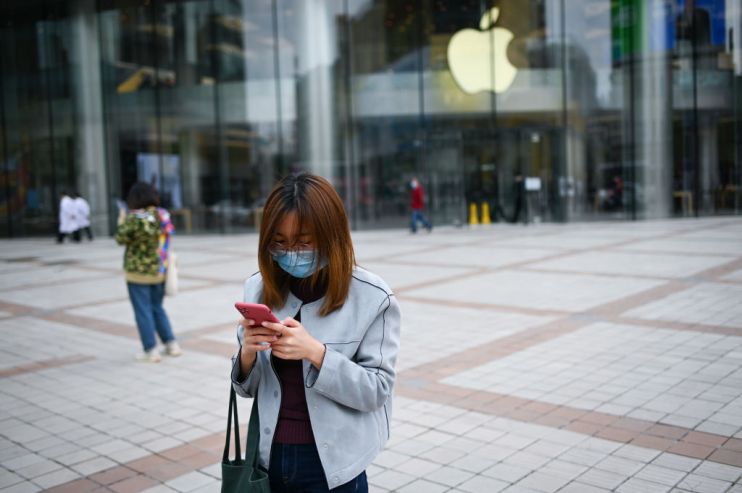Amazon and Apple earnings: Covid-19 crashes the tech titan party

It’s been a busy week for Silicon Valley as the major US tech firms lined up to report earnings for the first quarter.
Google, Facebook and Twitter all delivered upbeat figures, proving that social media services are well-placed to weather the Covid-19 storm.
But the mood was dampened somewhat last night as coronavirus costs weighed on Apple and Amazon, showing even the tech giants can be stung by the crisis.
Apple
While Facebook, Apple, Amazon, Netflix and Google (FAANG) are often banded together as Big Tech, the fundamental difference in their business models has never been clearer than in this week’s earnings.
The services provided by the likes of Facebook and Google have enjoyed booming demand — their major challenge is a downturn in the advertising market.
But Apple’s business model is more complicated, and Covid-19 has split its fortunes down the middle.
Overall, Apple beat expectations to post revenue of $58.3bn (£46.5bn) for the first quarter, while earnings per share hit $2.55.
Chief executive Tim Cook said sales in China were “heading the right direction” as lockdown lifted, but declined to give any guidance, sending shares down more than three per cent in after-hours trading.
The standout performer during the pandemic was Apple’s services division, which jumped 17 per cent to hit an all-time revenue high of $13.3bn amid rising demand for wearables and accessories.
But this was offset by a seven per cent decline in iPhone sales to $29bn as the coronavirus crisis battered consumer confidence.
“Despite plenty of talk around services, Apple is still very much a hardware business,” said Sophie Lund-Yates, equity analyst at Hargreaves Lansdown.
“Talk of problems with supply chains and demand in key markets aren’t ideal, but given the brunt of any disruption is yet to come, no one can truly say what the eventual fallout will be.”
The sales decline may also explain the upcoming launch of the revamped iPhone SE — the tech giant’s most affordable smartphone.
“The deviation away from the higher end is probably not surprising given the intense competition in the market, but it could well alienate some of its more affluent users who have paid a lot more for some of the same features which are now available in this smaller budget model, including the latest A13 bionic chip,” said Michael Hewson, chief market analyst at CMC Markets.
Information about subscriber numbers for Apple TV Plus — the firm’s streaming service — was also notable in its absence, with tough competition from Netflix and Disney Plus.
It’s not all bad for Apple investors, as the company hiked its dividend and launched a $50bn share buyback.
But shareholders and analysts will be looking to store reopenings and an easing of supply chain troubles before a return to normal is on the cards.
Amazon
“If you’re a shareowner in Amazon, you may want to take a seat,” boss Jeff Bezos told investors last night — an ominous sign for any shareholder.
Much like the social media firms, the ecommerce giant has seen a huge surge in demand as the closure of brick and mortar stores has pushed consumers to its site.
Revenue jumped 26 per cent in the first quarter to a whopping $75.4bn — equivalent to $33m per hour.
The gains were posted across Amazon’s business, with ecommerce, Amazon Prime streaming and Amazon Web Services — its cloud computing division — all growing.
But the surge in sales came at a cost, and profit crashed almost 30 per cent to $2.5bn.
Moreover, Bezos warned that the company would splash out $4bn in the coming month on a range of coronavirus measures, including hiking worker pay and buying personal protective equipment.
As a result, the firm warned it could swing to a loss of as much as $1.5bn in the second quarter, sending shares down almost five per cent post-close.
But analysts were impressed with Amazon’s decision to invest in its infrastructure during the crisis, saying it would likely emerge stronger on the other side.
Nicholas Hyett, equity analyst at Hargreaves Lansdown, branded the spending “radical”, adding that many management teams would “baulk at the cost”.
“However, we think the decision to use profits generated by AWS to protect and strengthen the retail business is interesting,” he said.
“As well as the obvious health benefits for Amazon’s 840,000 employees this could mark a watershed moment for client acquisition and sacrificing a single quarter’s profits to secure political and public goodwill would have long term advantages.”
Lewis Grant, senior global equities portfolio manager at Federated Hermes, said Amazon had taken a “socially responsible stance at an important moment”.
“Sustainable wealth creation requires companies to look beyond short-term profits and by using next quarter’s profits to improve employee and customer safety, Amazon is improving its ability to deliver in the long-term,” he said.